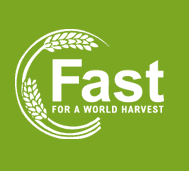An email I received from The ONE Campaign to Make Poverty History stated, "The problem isn't a lack of food. We have more than enough to go around. The problem is the distribution, something we, with other countries around the world, can be the first generation to fix."
Suggestions to raise awareness include participating in a Hunger Banquet on the Thursday before Thanksgiving (in the U.S.).
If the banquet included 20 people at the table, representing the world’s population:
- 3 would be served a gourmet, multi-course meal, while sitting at decorated table and a cushioned chair.
- 5 would eat rice and beans with a fork and sit on a simple cushion.
- 12 would wait in line to receive a small portion of rice that they would eat with their hands while sitting on the floor.
The true power of an Oxfam Hunger Banquet is that as you eat your meal, unlike the real world, you see what’s on everyone else’s plate.
 Another suggestion is to Skip a Meal for Oxfam. This helps to make one more conscious of the number of people all over the world who go without meals. The money saved can be contributed to Oxfam.
Another suggestion is to Skip a Meal for Oxfam. This helps to make one more conscious of the number of people all over the world who go without meals. The money saved can be contributed to Oxfam.A third option, that could be used by teachers for their students or parents for their children (as well as for themselves), is to play the Hunger Game. One "sits" at a banquet table, but the luck of the draw could mean either feast or famine.
The site also includes a Hunger Quiz and some "Recipes" for Change.
Although I accessed this information too late to bring it to the attention of my students in time to participate this year, I will certainly include the "games" in future lesson plans. In fact, in Japan the Hunger Game may be more appropriate at New Year's, which is generally a time for feasting on traditional food. Older generations, who grew up during or just after World War II, may well remember when there was little on the table besides course grain and pumpkin.
No comments:
Post a Comment